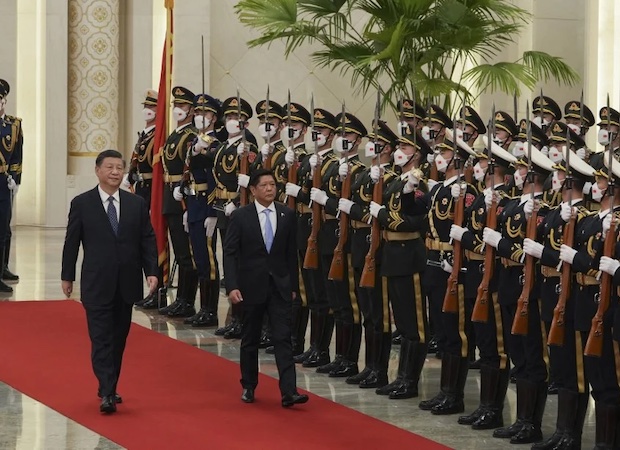Marcos visit to test ‘how truthful’ China is to pledges – analysts

This handout photograph released by the Office of the Press Secretary and taken on Jan. 4, 2023, shows China’s President Xi Jinping (left) and Philippine President Ferdinand Marcos Jr reviewing an honor guard during a welcome ceremony at the Great Hall of People in Beijing. (Photo from the Office of the Press Secretary via Agence France-Presse)
MANILA, Philippines — President Ferdinand Marcos Jr.’s three-day state visit to China last week would “test the waters and examine how truthful China can be on its words and promises,” according to analysts.
According to Marcos, his visit generated $22 billion in investment pledges, “some of [which] have already started.”
The Philippines and China also entered into 14 bilateral agreements on such areas as agriculture, tourism, energy, and maritime security.
The president in his trip also said that disputes in the South China Sea should not be regarded as “the sum” of Manila’s relations with Beijing. Marcos sought to distinguish that area from the country’s economic ties with China.
But Chester Cabalza of think tank International Development and Security Cooperation said most of the pledges in Marcos’ visit were “revivals and continuations of unfulfilled promises” from the previous administration of Rodrigo Duterte.
“Others were not even agreements but mutual understandings,” the analyst said.
“The state visit of Marcos Jr. to China [may be] seen as an ocular visit to test the waters and examine how truthful China can be on its words and promises,” he said.
Still, Cabalza said the visit was important since it allowed the president “to complete his puzzle to decipher what kind of foreign policy will guide his administration for the next five years to come.”
‘Nothing materialized’
Stratbase ADR Institute president Dindo Manhit said, when reached for comment, that “the benefits [of Marcos’ visit] we still need to monitor, because [with the country’s] experience during the Duterte administration, [there was] so much hype and promises but nothing materialized that would have benefited the Philippine economy.”
He said protection of the country’s maritime territory must remain a strategic priority in the government’s foreign policy.
“The president should be consistent with his promise of asserting the country’s maritime rights and protecting territorial integrity, which he repeatedly stated before and after he won the presidential elections,” Manhit said.
‘Rehash’
Among the agreements between the Philippines and China is a memorandum of understanding to establish “direct communication” between their foreign offices to prevent “miscalculations and miscommunications” on the West Philippine Sea.
Cabalza said the hotline was “a rehash of the 2017 coast guard diplomacy [pursued] by China and the Philippines [which] brought more miscommunications and miscalculations.”
Manhit said no agreement can take effect “unless China recognizes the Philippines’ legal victory under the 2016 arbitral ruling and halts all activities in Philippine waters.”
Regarding the proposed joint oil and gas exploration between the Philippines and China in the West Philippine Sea, Sen. Sherwin Gatchalian said any such undertaking “must adhere to our domestic law and the Constitution.”
“China knows that’s our minimum [requirement]. On that issue alone, the planned negotiation will not move forward because China will not agree to it,” the senator said in a radio interview on Sunday.
“That alone will cause a problem,” he added.
“We should insist that our local law and the Constitution should be observed because [any] joint exploration will be done within our EEZ (exclusive economic zone),” Gatchalian said.